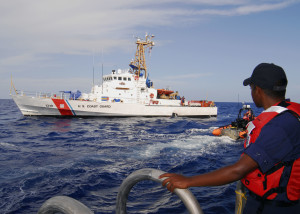
There is a growing hoax call problem on United State of America’s Channel 16 maritime distress frequency, with perpetrators often going unpunished due to a lack of offshore geo-location capability for Coast Guard and local law enforcement investigators.
As part of a project to better identify, geo-locate and prosecute SAR hoax callers, representatives from the US Coast Guard Research and Development Center and the Coast Guard Investigative Service (CGIS) have partnered with forensic scientists at Carnegie Mellon University. This CMU team specializes in voice forensics and audio analytics, which serves as a critical part of the R&D Center’s plan to tackle the SAR hoax call phenomenon.
The overall project employs enhanced direction-finding equipment, social media monitoring and awareness efforts to find potential hoax callers, but the real crux of the prosecutorial value lies in CMU’s audio forensics capabilities.
CMU technology provides voice forensics analysis that can glean several key biometric and environmental “cues” enabling Coast Guard technology agents to identify criminals.
To further deter serial and future SAR hoax callers, the Coast Guard R&D Center has partnered with media representatives from Rutgers University’s Command, Control, and Interoperability Center for Advanced Data Analysis (CCICADA) to publicize the Coast Guard’s approach to identify, geo-locate and prosecute these criminals.
Copyright Ships & Ports Ltd. Permission to use quotations from this article is granted subject to appropriate credit given to www.shipsandports.com.ng as the source.